Righteous Anger - Kingfisher
See just this Post & Comments / 0 Comments so far / Post a Comment / Home"Nothing comes to the wronged so easily as righteous anger." (next)
The anonomous author of an article in Economist: Intellectual property, The real lesson of BlackBerry appears to have coined the phrase - Google gives me no other references. Interesting. I jotted it down as I was reading the article and I have now come back to my jotting.
The hop-skip-and-jump of it is worthy of Gerald Manley Hopkins' sprung rhythm:
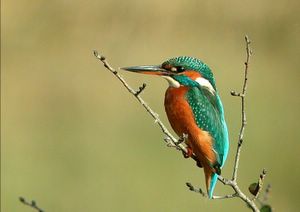 AS kingfishers catch fire, dragonflies dráw fláme;
AS kingfishers catch fire, dragonflies dráw fláme; As tumbled over rim in roundy wells
Stones ring; like each tucked string tells, each hung bell’s
Bow swung finds tongue to fling out broad its name;
Each mortal thing does one thing and the same:
Deals out that being indoors each one dwells;
Selves - goes itself; myself it speaks and spells,
Crying Whát I do is me: for that I came.
Í say móre: the just man justices;
Kéeps gráce: thát keeps all his goings graces;
Acts in God’s eye what in God’s eye he is -
Chríst - for Christ plays in ten thousand places,
Lovely in limbs, and lovely in eyes not his
To the Father through the features of men’s faces.
 Pretentious nonsense though, it seems to me, looking seriously at it. Of course the wronged are righteously angry, little matter if it be their first or second or third response. But this article is about a group who have nothing to be righteously angry about, who are not wronged, although they may feel that they have been. So the implication, in (either) the hyper-correct mind of the anonymous author (or) simply through slipshod thinking/writing/editing, is that there is something wrong with raging when you are wronged? No Lear? No Titus Andronicus?
Pretentious nonsense though, it seems to me, looking seriously at it. Of course the wronged are righteously angry, little matter if it be their first or second or third response. But this article is about a group who have nothing to be righteously angry about, who are not wronged, although they may feel that they have been. So the implication, in (either) the hyper-correct mind of the anonymous author (or) simply through slipshod thinking/writing/editing, is that there is something wrong with raging when you are wronged? No Lear? No Titus Andronicus?Have I stumbled on something here? Is the true source of all of this bureaucratic correctitude nothing more than slipshod thinking repeated?
Kingfisher
Ceyx and Alcyone (back next)
Ovid, Metamorphoses, Book 11 Summary
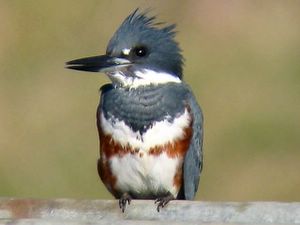 After Ceyx' brother, Daedalion, is turned to a hawk, Ceyx departs to visit the oracle of Apollo. Alcyone, his wife, is afraid for his safety, but after a tearful goodbye, and promising to return, he sails off to the oracle. A storm wrecks the ship, drowning all on board. Before death, Ceyx prays that he will wash up on his native shore so that he can return to his wife as promised.
After Ceyx' brother, Daedalion, is turned to a hawk, Ceyx departs to visit the oracle of Apollo. Alcyone, his wife, is afraid for his safety, but after a tearful goodbye, and promising to return, he sails off to the oracle. A storm wrecks the ship, drowning all on board. Before death, Ceyx prays that he will wash up on his native shore so that he can return to his wife as promised.Alcyone does not know that her husband is dead, and prays to Juno for his safety. Juno sends her messenger, Iris, to make Sleep break the bad news in a dream. Alcyone is heartbroken, and as she stands on the shore she sees Ceyx' body floating on the waves. She rushes over the water to reach him and is changed into a kingfisher. Ceyx is transformed also and they live out their lives on the sea, even raising their young on the waves.
Juno sees to it that their breeding season is protected from storms - the 14 Halcyon Days around the Winter Solstice.
Ceyx and Alcyone (back next)
Ovid, Metamorphoses, Book 11
 These prodigies affect the pious prince,
These prodigies affect the pious prince, But more perplex'd with those that happen'd since,
He purposes to seek the Clarian God,
Avoiding Delphi, his more fam'd abode,
Since Phlegyan robbers made unsafe the road.
Yet could he not from her he lov'd so well,
The fatal voyage, he resolv'd, conceal;
But when she saw her lord prepar'd to part,
A deadly cold ran shiv'ring to her heart;
Her faded cheeks are chang'd to boxen hue,
And in her eyes the tears are ever new.
She thrice essay'd to speak; her accents hung,
And falt'ring dy'd unfinish'd on her tongue,
And vanish'd into sighs: with long delay
Her voice return'd, and found the wonted way.
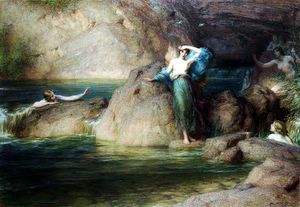 Tell me, my lord, she said, what fault unknown
Tell me, my lord, she said, what fault unknown Thy once belov'd Alcyone has done?
Whither, ah, whither, is thy kindness gone!
Can Ceyx then sustain to leave his wife,
And unconcern'd forsake the sweets of life?
What can thy mind to this long journey move?
Or need'st thou absence to renew thy love?
Yet, if thou go'st by land, tho' grief possess
My soul ev'n then, my fears will be the less.
But ah! be warn'd to shun the watry way,
The face is frightful of the stormy sea:
For late I saw a-drift disjointed planks,
And empty tombs erected on the banks.
Nor let false hopes to trust betray thy mind,
Because my sire in caves constrains the wind,
Can with a breath their clam'rous rage appease,
They fear his whistle, and forsake the seas:
Not so; for once indulg'd, they sweep the main;
Deaf to the call, or hearing, hear in vain;
But bent on mischief bear the waves before,
And not content with seas, insult the shore,
When ocean, air, and Earth, at once ingage,
And rooted forests fly before their rage:
At once the clashing clouds to battel move,
And lightnings run across the fields above:
I know them well, and mark'd their rude comport,
While yet a child within my father's court:
In times of tempest they command alone,
And he but sits precarious on the throne:
The more I know, the more my fears augment;
And fears are oft prophetick of th' event.
But if not fears, or reasons will prevail,
If Fate has fix'd thee obstinate to sail,
Go not without thy wife, but let me bear
My part of danger with an equal share,
And present, what I suffer only fear:
Then o'er the bounding billows shall we fly,
Secure to live together, or to die.
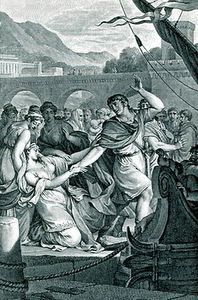 These reasons mov'd her warlike husband's heart,
These reasons mov'd her warlike husband's heart, But still he held his purpose to depart:
For as he lov'd her equal to his life,
He would not to the seas expose his wife;
Nor could be wrought his voyage to refrain,
But sought by arguments to sooth her pain:
Nor these avail'd; at length he lights on one,
With which so difficult a cause he won:
My love, so short an absence cease to fear,
For by my father's holy flame I swear,
Before two moons their orb with light adorn,
If Heav'n allow me life, I will return.
This promise of so short a stay prevails;
He soon equips the ship, supplies the sails,
And gives the word to launch; she trembling views
This pomp of death, and parting tears renews:
Last with a kiss, she took a long farewel,
Sigh'd with a sad presage, and swooning fell:
While Ceyx seeks delays, the lusty crew,
Rais'd on their banks, their oars in order drew
To their broad breasts, the ship with fury flew.
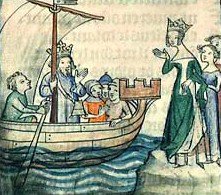 The queen recover'd, rears her humid eyes,
The queen recover'd, rears her humid eyes, And first her husband on the poop espies,
Shaking his hand at distance on the main;
She took the sign, and shook her hand again.
Still as the ground recedes, contracts her view
With sharpen'd sight, 'till she no longer knew
The much-lov'd face; that comfort lost supplies
With less, and with the galley feeds her eyes;
The galley born from view by rising gales,
She follow'd with her sight the flying sails:
When ev'n the flying sails were seen no more,
Forsaken of all sight she left the shore.
 Then on her bridal bed her body throws,
Then on her bridal bed her body throws, And sought in sleep her wearied eyes to close:
Her husband's pillow, and the widow'd part
Which once he press'd, renew'd the former smart.
And now a breeze from shoar began to blow,
The sailors ship their oars, and cease to row;
Then hoist their yards a-trip, and all their sails
Let fall, to court the wind, and catch the gales:
By this the vessel half her course had run,
Both shoars were lost to sight, when at the close
Of day a stiffer gale at east arose:
The sea grew white, the rouling waves from far,
Like heralds, first denounce the watry war.
 This seen, the master soon began to cry,
This seen, the master soon began to cry, Strike, strike the top-sail; let the main-sheet fly,
And furl your sails: the winds repel the sound,
And in the speaker's mouth the speech is drown'd.
Yet of their own accord, as danger taught
Each in his way, officiously they wrought;
Some stow their oars, or stop the leaky sides,
Another bolder, yet the yard bestrides,
And folds the sails; a fourth with labour laves
Th' intruding seas, and waves ejects on waves.
In this confusion while their work they ply,
The winds augment the winter of the sky,
And wage intestine wars; the suff'ring seas
Are toss'd, and mingled, as their tyrants please.
The master would command, but in despair
Of safety, stands amaz'd with stupid care,
Nor what to bid, or what forbid he knows,
Th' ungovern'd tempest to such fury grows:
Vain is his force, and vainer is his skill;
With such a concourse comes the flood of ill;
The cries of men are mix'd with rattling shrowds;
Seas dash on seas, and clouds encounter clouds:
At once from east to west, from pole to pole,
The forky lightnings flash, the roaring thunders roul.
 Now waves on waves ascending scale the skies,
Now waves on waves ascending scale the skies, And in the fires above the water fries:
When yellow sands are sifted from below,
The glittering billows give a golden show:
And when the fouler bottom spews the black
The Stygian dye the tainted waters take:
Then frothy white appear the flatted seas,
And change their colour, changing their disease,
Like various fits the Trachin vessel finds,
And now sublime, she rides upon the winds;
As from a lofty summit looks from high,
And from the clouds beholds the nether sky;
Now from the depth of Hell they lift their sight,
And at a distance see superior light;
The lashing billows make a loud report,
And beat her sides, as batt'ring rams a fort:
Or as a lion bounding in his way,
With force augmented, bears against his prey,
Sidelong to seize; or unapal'd with fear,
Springs on the toils, and rushes on the spear:
So seas impell'd by winds, with added pow'r
Assault the sides, and o'er the hatches tow'r.
 The planks (their pitchy cov'ring wash'd away)
The planks (their pitchy cov'ring wash'd away) Now yield; and now a yawning breach display:
The roaring waters with a hostile tide
Rush through the ruins of her gaping side.
Mean-time in sheets of rain the sky descends,
And ocean swell'd with waters upwards tends;
One rising, falling one, the Heav'ns and sea
Meet at their confines, in the middle way:
The sails are drunk with show'rs, and drop with rain,
Sweet waters mingle with the briny main.
No star appears to lend his friendly light;
Darkness, and tempest make a double night;
But flashing fires disclose the deep by turns,
And while the lightnings blaze, the water burns.
 Now all the waves their scatter'd force unite,
Now all the waves their scatter'd force unite, And as a soldier foremost in the fight,
Makes way for others, and an host alone
Still presses on, and urging gains the town;
So while th' invading billows come a-breast,
The hero tenth advanc'd before the rest,
Sweeps all before him with impetuous sway,
And from the walls descends upon the prey;
Part following enter, part remain without,
With envy hear their fellows' conqu'ring shout,
And mount on others' backs, in hopes to share
The city, thus become the seat of war.
 An universal cry resounds aloud,
An universal cry resounds aloud, The sailors run in heaps, a helpless crowd;
Art fails, and courage falls, no succour near;
As many waves, as many deaths appear.
One weeps, and yet despairs of late relief;
One cannot weep, his fears congeal his grief,
But stupid, with dry eyes expects his fate:
One with loud shrieks laments his lost estate,
And calls those happy whom their fun'rals wait.
This wretch with pray'rs and vows the Gods implores,
And ev'n the skies he cannot see, adores.
That other on his friends his thoughts bestows,
His careful father, and his faithful spouse.
The covetous worldling in his anxious mind,
Thinks only on the wealth he left behind.
 All Ceyx his Alcyone employs,
All Ceyx his Alcyone employs, For her he grieves, yet in her absence joys:
His wife he wishes, and would still be near,
Not her with him, but wishes him with her:
Now with last looks he seeks his native shoar,
Which Fate has destin'd him to see no more;
He sought, but in the dark tempestuous night
He knew not whither to direct his sight.
So whirl the seas, such darkness blinds the sky,
That the black night receives a deeper dye.
 The giddy ship ran round; the tempest tore
The giddy ship ran round; the tempest tore Her mast, and over-board the rudder bore.
One billow mounts, and with a scornful brow,
Proud of her conquest gain'd, insults the waves below;
Nor lighter falls, than if some giant tore
Pindus and Athos with the freight they bore,
And toss'd on seas; press'd with the pond'rous blow,
Down sinks the ship within th' abyss below:
Down with the vessel sink into the main
The many, never more to rise again.
Some few on scatter'd planks, with fruitless care,
Lay hold, and swim; but while they swim, despair.
 Ev'n he who late a scepter did command,
Ev'n he who late a scepter did command, Now grasps a floating fragment in his hand;
And while he struggles on the stormy main,
Invokes his father, and his wife's, in vain.
But yet his consort is his greatest care,
Alcyone he names amidst his pray'r;
Names as a charm against the waves and wind;
Most in his mouth, and ever in his mind.
Tir'd with his toil, all hopes of safety past,
From pray'rs to wishes he descends at last;
That his dead body, wafted to the sands,
Might have its burial from her friendly hands,
As oft as he can catch a gulp of air,
And peep above the seas, he names the fair;
And ev'n when plung'd beneath, on her he raves,
Murm'ring Alcyone below the waves:
At last a falling billow stops his breath,
Breaks o'er his head, and whelms him underneath.
That night, his heav'nly form obscur'd with tears,
And since he was forbid to leave the skies,
He muffled with a cloud his mournful eyes.
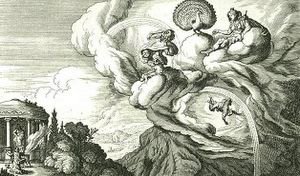 Mean-time Alcyone (his fate unknown)
Mean-time Alcyone (his fate unknown) Computes how many nights he had been gone.
Observes the waining moon with hourly view,
Numbers her age, and wishes for a new;
Against the promis'd time provides with care,
And hastens in the woof the robes he was to wear:
And for her self employs another loom,
New-dress'd to meet her lord returning home,
Flatt'ring her heart with joys, that never were to come:
She fum'd the temples with an od'rous flame,
And oft before the sacred altars came,
To pray for him, who was an empty name.
All Pow'rs implor'd, but far above the rest
To Juno she her pious vows address'd,
Her much-lov'd lord from perils to protect,
And safe o'er seas his voyage to direct:
Then pray'd, that she might still possess his heart,
And no pretending rival share a part;
This last petition heard of all her pray'r,
The rest, dispers'd by winds, were lost in air.
 But she, the Goddess of the nuptial bed,
But she, the Goddess of the nuptial bed, Tir'd with her vain devotions for the dead,
Resolv'd the tainted hand should be repell'd,
Which incense offer'd, and her altar held:
Then Iris thus bespoke: Thou faithful maid,
By whom thy queen's commands are well convey'd,
Haste to the house of sleep, and bid the God
Who rules the night by visions with a nod,
Prepare a dream, in figure, and in form
Resembling him, who perish'd in the storm;
This form before Alcyone present,
To make her certain of the sad event.
Indu'd with robes of various hue she flies,
And flying draws an arch (a segment of the skies):
Then leaves her bending bow, and from the steep
Descends, to search the silent house of sleep.
The House of Sleep
 Near the Cymmerians, in his dark abode,
Near the Cymmerians, in his dark abode, Deep in a cavern, dwells the drowzy God;
Whose gloomy mansion nor the rising sun,
Nor setting, visits, nor the lightsome noon;
But lazy vapours round the region fly,
Perpetual twilight, and a doubtful sky:
No crowing cock does there his wings display,
Nor with his horny bill provoke the day;
Nor watchful dogs, nor the more wakeful geese,
Disturb with nightly noise the sacred peace;
Nor beast of Nature, nor the tame are nigh,
Nor trees with tempests rock'd, nor human cry;
But safe repose without an air of breath
Dwells here, and a dumb quiet next to death.
 An arm of Lethe, with a gentle flow
An arm of Lethe, with a gentle flow Arising upwards from the rock below,
The palace moats, and o'er the pebbles creeps,
And with soft murmurs calls the coming sleeps.
Around its entry nodding poppies grow,
And all cool simples that sweet rest bestow;
Night from the plants their sleepy virtue drains,
And passing, sheds it on the silent plains:
No door there was th' unguarded house to keep,
On creaking hinges turn'd, to break his sleep.
 But in the gloomy court was rais'd a bed,
But in the gloomy court was rais'd a bed, Stuff'd with black plumes, and on an ebon-sted:
Black was the cov'ring too, where lay the God,
And slept supine, his limbs display'd abroad:
About his head fantastick visions fly,
Which various images of things supply,
And mock their forms; the leaves on trees not more,
Nor bearded ears in fields, nor sands upon the shore.
The virgin ent'ring bright, indulg'd the day
To the brown cave, and brush'd the dreams away:
The God disturb'd with this new glare of light,
Cast sudden on his face, unseal'd his sight,
And rais'd his tardy head, which sunk again,
And sinking, on his bosom knock'd his chin;
At length shook off himself, and ask'd the dame,
(And asking yawn'd) for what intent she came.
 To whom the Goddess thus: O sacred rest,
To whom the Goddess thus: O sacred rest, Sweet pleasing sleep, of all the Pow'rs the best!
O peace of mind, repairer of decay,
Whose balms renew the limbs to labours of the day,
Care shuns thy soft approach, and sullen flies away!
Adorn a dream, expressing human form,
The shape of him who suffer'd in the storm,
And send it flitting to the Trachin court,
The wreck of wretched Ceyx to report:
Before his queen bid the pale spectre stand,
Who begs a vain relief at Juno's hand.
She said, and scarce awake her eyes could keep,
Unable to support the fumes of sleep;
But fled, returning by the way she went,
And swerv'd along her bow with swift ascent.
 The God, uneasy 'till he slept again,
The God, uneasy 'till he slept again, Resolv'd at once to rid himself of pain;
And, tho' against his custom, call'd aloud,
Exciting Morpheus from the sleepy crowd:
Morpheus, of all his numerous train, express'd
The shape of man, and imitated best;
The walk, the words, the gesture could supply,
The habit mimick, and the mein bely;
Plays well, but all his action is confin'd,
Extending not beyond our human kind.
Another, birds, and beasts, and dragons apes,
And dreadful images, and monster shapes:
This demon, Icelos, in Heav'n's high hall
The Gods have nam'd; but men Phobetor call.
A third is Phantasus, whose actions roul
On meaner thoughts, and things devoid of soul;
Earth, fruits, and flow'rs he represents in dreams,
And solid rocks unmov'd, and running streams.
These three to kings, and chiefs their scenes display,
The rest before th' ignoble commons play.
Of these the chosen Morpheus is dispatch'd;
Which done, the lazy monarch, over-watch'd,
Down from his propping elbow drops his head,
Dissolv'd in sleep, and shrinks within his bed.
 Darkling the demon glides, for flight prepar'd,
Darkling the demon glides, for flight prepar'd, So soft, that scarce his fanning wings are heard.
To Trachin, swift as thought, the flitting shade,
Thro' air his momentary journey made:
Then lays aside the steerage of his wings,
Forsakes his proper form, assumes the king's;
And pale, as death, despoil'd of his array,
Into the queen's apartment takes his way,
And stands before the bed at dawn of day:
Unmov'd his eyes, and wet his beard appears;
And shedding vain, but seeming real tears;
The briny waters dropping from his hairs.
Then staring on her with a ghastly look,
And hollow voice, he thus the queen bespoke.
 Know'st thou not me? Not yet, unhappy wife?
Know'st thou not me? Not yet, unhappy wife? Or are my features perish'd with my life?
Look once again, and for thy husband lost,
Lo all that's left of him, thy husband's ghost!
Thy vows for my return were all in vain,
The stormy south o'ertook us in the main,
And never shalt thou see thy living lord again.
Bear witness, Heav'n, I call'd on thee in death,
And while I call'd, a billow stop'd my breath.
Think not, that flying fame reports my fate;
I present, I appear, and my own wreck relate.
Rise, wretched widow, rise; nor undeplor'd
Permit my soul to pass the Stygian ford;
But rise, prepar'd in black, to mourn thy perish'd lord.
 Thus said the player-God; and adding art
Thus said the player-God; and adding art Of voice and gesture, so perform'd his part,
She thought (so like her love the shade appears)
That Ceyx spake the words, and Ceyx shed the tears;
She groan'd, her inward soul with grief opprest,
She sigh'd, she wept, and sleeping beat her breast;
Then stretch'd her arms t' embrace his body bare;
Her clasping arms inclose but empty air:
At this, not yet awake, she cry'd, O stay;
One is our fate, and common is our way!
 So dreadful was the dream, so loud she spoke,
So dreadful was the dream, so loud she spoke, That starting sudden up, the slumber broke:
Then cast her eyes around, in hope to view
Her vanish'd lord, and find the vision true:
For now the maids, who waited her commands,
Ran in with lighted tapers in their hands.
Tir'd with the search, not finding what she seeks,
With cruel blows she pounds her blubber'd cheeks;
Then from her beaten breast the linnen tare,
And cut the golden caul that bound her hair.
Her nurse demands the cause; with louder cries
She prosecutes her griefs, and thus replies.
 No more Alcyone; she suffer'd death
No more Alcyone; she suffer'd death With her lov'd lord, when Ceyx lost his breath:
No flatt'ry, no false comfort, give me none,
My shipwreck'd Ceyx is for ever gone:
I saw, I saw him manifest in view,
His voice, his figure, and his gestures knew:
His lustre lost, and ev'ry living grace,
Yet I retain'd the features of his face;
Tho' with pale cheeks, wet beard, and dropping hair,
None but my Ceyx could appear so fair:
I would have strain'd him with a strict embrace,
But thro' my arms he slipt, and vanish'd from the place:
There, ev'n just there he stood; and as she spoke,
Where last the spectre was she cast her look:
Fain would she hope, and gaz'd upon the ground,
If any printed footsteps might be found.
 Then sigh'd, and said: This I too well foreknew,
Then sigh'd, and said: This I too well foreknew, And my prophetick fears presag'd too true:
'Twas what I begg'd, when with a bleeding heart
I took my leave, and suffer'd thee to part;
Or I to go along, or thou to stay,
Never, ah never to divide our way!
Happier for me, that all our hours assign'd
Together we had liv'd; ev'n not in death disjoin'd!
So had my Ceyx still been living here,
Or with my Ceyx I had perish'd there:
Now I die absent, in the vast profound;
And me, without my self, the seas have drown'd.
The storms were not so cruel: should I strive
To lengthen life, and such a grief survive;
But neither will I strive, nor wretched thee
In death forsake, but keep thee company.
If not one common sepulchre contains
Our bodies, or one urn our last remains,
Yet Ceyx and Alcyone shall join,
Their names remember'd in one common line.
 No farther voice her mighty grief affords,
No farther voice her mighty grief affords, For sighs come rushing in betwixt her words,
And stop'd her tongue; but what her tongue deny'd,
Soft tears, and groans, and dumb complaints supply'd.
'Twas morning; to the port she takes her way,
And stands upon the margin of the sea:
That place, that very spot of ground she sought,
Or thither by her destiny was brought,
Where last he stood: and while she sadly said,
'Twas here he left me, lingring here delay'd
His parting kiss, and there his anchors weigh'd.
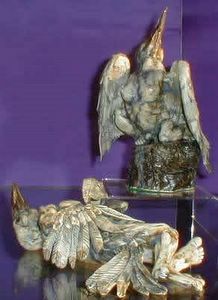 Thus speaking, while her thoughts past actions trace,
Thus speaking, while her thoughts past actions trace, And call to mind, admonish'd by the place,
Sharp at her utmost ken she cast her eyes,
And somewhat floating from afar descries:
It seems a corps a-drift to distant sight,
But at a distance who could judge aright?
It wafted nearer yet, and then she knew,
That what before she but surmis'd, was true:
A corps it was, but whose it was, unknown,
Yet mov'd, howe'er, she made the cause her own.
Took the bad omen of a shipwreck'd man,
As for a stranger wept, and thus began.
Poor wretch, on stormy seas to lose thy life,
Unhappy thou, but more thy widow'd wife;
At this she paus'd: for now the flowing tide
Had brought the body nearer to the side:
The more she looks, the more her fears increase,
At nearer sight; and she's her self the less:
Now driv'n ashore, and at her feet it lies,
She knows too much in knowing whom she sees:
Her husband's corps; at this she loudly shrieks,
'Tis he, 'tis he, she cries, and tears her cheeks,
Her hair, and vest; and stooping to the sands,
About his neck she cast her trembling hands.
 And is it thus, o dearer than my life,
And is it thus, o dearer than my life, Thus, thus return'st thou to thy longing wife!
She said, and to the neighbouring mole she strode,
(Rais'd there to break th' incursions of the flood).
Headlong from hence to plunge her self she springs,
But shoots along, supported on her wings;
A bird new-made, about the banks she plies,
Not far from shore, and short excursions tries;
Nor seeks in air her humble flight to raise,
Content to skim the surface of the seas:
Her bill tho' slender, sends a creaking noise,
And imitates a lamentable voice.
Now lighting where the bloodless body lies,
She with a fun'ral note renews her cries:
At all her stretch, her little wings she spread,
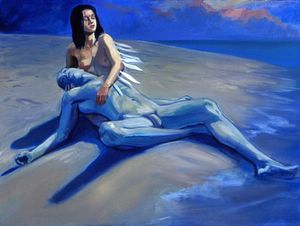 And with her feather'd arms embrac'd the dead:
And with her feather'd arms embrac'd the dead: Then flick'ring to his palid lips, she strove
To print a kiss, the last essay of love.
Whether the vital touch reviv'd the dead,
Or that the moving waters rais'd his head
To meet the kiss, the vulgar doubt alone;
For sure a present miracle was shown.
The Gods their shapes to winter-birds translate,
But both obnoxious to their former fate.
Their conjugal affection still is ty'd,
And still the mournful race is multiply'd:
They bill, they tread; Alcyone compress'd,
Sev'n days sits brooding on her floating nest:
A wintry queen: her sire at length is kind,
Calms ev'ry storm, and hushes ev'ry wind;
Prepares his empire for his daughter's ease,
And for his hatching nephews smooths the seas.
Okishkimonisse Saves the Summer Birds (back next)
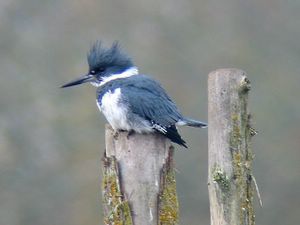 A great many years ago, a giant found that he could make the winter stay in the north country all year long if he put the birds of summer in cages. When the time came for the weather to turn warm, there was no change. It stayed very, very cold. There were no wrens or robins, no woodpeckers, larks, finches, nor any of the other birds that returned to the land of the Ojibwe during the spring and summer.
A great many years ago, a giant found that he could make the winter stay in the north country all year long if he put the birds of summer in cages. When the time came for the weather to turn warm, there was no change. It stayed very, very cold. There were no wrens or robins, no woodpeckers, larks, finches, nor any of the other birds that returned to the land of the Ojibwe during the spring and summer. In the north, the Ojibwe people were in misery. All they could think of were the warm summer months, as they shivered all day long in the cold. There was very little food left. The animals tried to eat bark from the aspen tree as they had seen the beaver do, but they discovered this was a poor substitute for their regular diets. Finally, the people and the animals gathered together in Council.
They were determined to find the summer birds and make them return to the north, bringing the summer weather with them. However, out of all the men and animals, it was the small Kingfisher, Okishkimonisse, who finally offered to go and find the one causing all these problems and bring the summer birds back home.
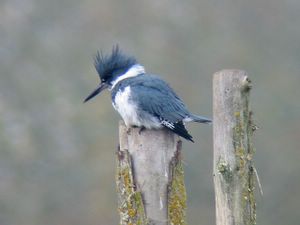 The next day, Okishkimonisse started out on his journey, taking only a small ball of wax to use as a weapon. Day after day, he flew southward, the direction he had watched the summer birds fly when they left the year before. He traveled a full moon before he finally reached the home of the giant. The giant was asleep when Okishkimonisse arrived, but he had posted two crows as guards.
The next day, Okishkimonisse started out on his journey, taking only a small ball of wax to use as a weapon. Day after day, he flew southward, the direction he had watched the summer birds fly when they left the year before. He traveled a full moon before he finally reached the home of the giant. The giant was asleep when Okishkimonisse arrived, but he had posted two crows as guards.Now, Okishkimonisse was able to move quietly, and before the crows knew it, the Kingfisher had dropped down on them, clamped their bills shut, and sealed them tightly with the ball of wax. This kept the crows from calling out to the giant.
Then quietly, so as to not make a sound, Okishkimonisse crept inside to where the cages of the summer birds were kept. One by one, he opened the bird's cages. The birds tested their wings after their long captivity and as soon as they began to fan the air, it began to get warm. The snow melted and the plants began to break through the earth. As the birds flew northward, they brought summer to the waiting people along the way. When the birds finally arrived in the north country, the Ojibwe people knew that the Kingfisher had succeeded in his mission.
Now, the giant had slept through all of this. But, eventually, the summer's heat had caused the wax on the crow's bills to melt. Then the Crows called out to their master. "The summer birds!" they cawed. "Okishkimonisse has opened their cages and let them all escape!"
The giant was up in an instant and was soon chasing Okishkimonisse with his bow and arrow. He chased the fisher up a rocky hillside, overlooking a beautiful green valley. When he reached the edge of the cliff, the fisher jumped and flew toward the sky. The giant followed, aiming his arrow as he left the ground. The arrow hit the bird, but only wounded him.
Today, the fisher flies high in the sky, but he still has a crooked tail.
Andaman and Nicobar Islands, Bay of Bengal (back next)
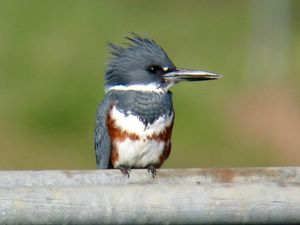 After Puluga had made the world, he created man and called him Tomo. He was black in color like his modern-day descendants but much taller and bearded. Puluga showed Tomo how to use fire, but not directly.
After Puluga had made the world, he created man and called him Tomo. He was black in color like his modern-day descendants but much taller and bearded. Puluga showed Tomo how to use fire, but not directly.Some say it was Prawn who first obtained fire. Some yam leaves, being shriveled and dry, caught fire in the sun and burnt. Prawn made a bigger fire by adding some firewood and went to sleep. But Kingfisher stole the fire and ran away with it. He made a fire and cooked some fish. When he had filled his belly, he went to sleep. Then Dove stole the fire from Kingfisher while he slept and ran away. It was Dove, the last of the thieves, who gave the fire to Tomo, the ancestor of the people.
Still, the people could not make fire themselves but had to nurse it carefully in special containers they carried around with them on their frequent wanderings. If the fire was allowed to go out through carelessness or accident, a new flame had to be sought from a friendly neighboring tribe, which was embarrassing, or a natural fire caused by lighting had to be awaited.
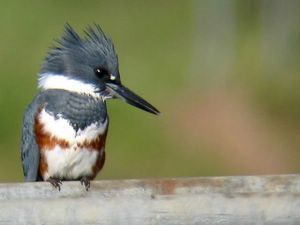 Some say that one day Tomo shot an arrow at a hill of fire, a volcano, whereupon the arrow burst into flames. The burning arrow was found and brought back to camp by Kingfisher, but he refused to share the fire with the people. After asking for it in vain, the people stole it from kingfisher and kept it for themselves.
Some say that one day Tomo shot an arrow at a hill of fire, a volcano, whereupon the arrow burst into flames. The burning arrow was found and brought back to camp by Kingfisher, but he refused to share the fire with the people. After asking for it in vain, the people stole it from kingfisher and kept it for themselves.Fire was saved from the flood by Monitor Lizard and Civet Cat. When Monitor Lizard found that he could not carry the fire up a tree, his wife Civet Cat took it from him and carried it to the top of the hill where she kept it safe until the rain and flood had stopped.
Puluga also showed Tomo how to cook pigs which in those days were easy to catch as they had neither ears nor noses. Later Puluga created a woman whose name was Chan Elewadi. Tomo and Chan Elewadi had two daughters and two sons. When pigs became plentiful enough to be a nuisance, the clever woman drilled holes into their snouts and heads, thereby enabling them to hear and see to avoid danger and procure food for themselves. Puluga then covered the whole land with jungle in which the newly-equipped pigs could hide, thereby becoming much more difficult to catch. Puluga came to the rescue of the people by showing Tomo how to hunt with the help of bow and arrows as well as how to build canoes and how to fish. He showed Chan Elewadi how to weave baskets, make fishing nets and to use ochre and white clay. He also set down a number of rules and regulations such as a prohibition on noisy work at night during the wet season. Puluga also gave the people their language. In those days Puluga lived on Saddle Peak and being so near could visit and instruct his people. The canoes of those early days were not equipped with outriggers and were made of the hollowed out trunk of the pandanus tree which was said to have grown much bigger then. Tomo was said to have lived to a great old age and to have seen his descendants increase in number to such a degree that the original homeland could no longer accommodate them all. Puluga then interfered again and had them all equipped with weapons, implements, fire and their own language before they scattered in pairs all over the country. Tomo and his wife later drowned and were turned into a whale and a small crab respectively.
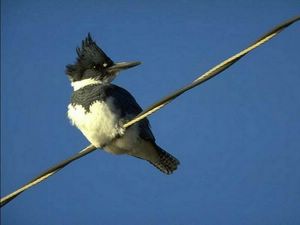 Tomo's successor was his grandson, Kolwot, who distinguished himself by being the first to catch turtle. After Kolwot's death, the people became remiss of the commands given to them at the creation. Puluga ceased to visit them and then without further warning sent a devastating flood.
Tomo's successor was his grandson, Kolwot, who distinguished himself by being the first to catch turtle. After Kolwot's death, the people became remiss of the commands given to them at the creation. Puluga ceased to visit them and then without further warning sent a devastating flood.Only four people survived this flood: two men, Loralola and Poilola, and two women, Kalola and Rimalola. When they landed they found they had lost their fire and all living things had perished. Puluga then recreated the animals and plants but does not seem to have given any further instructions, nor did he return the fire to the survivors. They suffered grievously. At this critical moment, one of their recently-drowned friends reappeared in the form of a Kingfisher. He noticed their distress and flew up to the sky where he found Puluga seated beside his fire. He seized a burning log and tried to fly to earth with it. The Kingfisher dropped the log on Puluga who suffered burns and angrily hurled the log at the bird.
It missed its mark and instead fell near the four survivors people who thus had their problem solved for them.
After settling down to their reduced circumstances, the survivors began to entertain thoughts of revenge against Puluga who had killed all their friends. When they met Puluga one day they thought of killing him. Puluga himself talked them out of this when he made clear to them that he was too hard for their arrows and that if they tried to kill him, he would kill them all. He also explained to them that their people had brought the deluge upon themselves by their disobedience. Thus obedience and submission was restored. It was said that this was the last time Puluga rendered himself visible or held any communications with his people.
Why Coyote changed the course of the Coumbia River (back next)
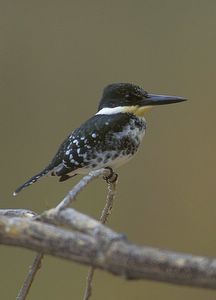 Coyote had a tepee near the Sanpoil River. Kingfisher had a tepee there too. Four brothers, the Wolves, had a tepee there. So there were three tepees of them.
Coyote had a tepee near the Sanpoil River. Kingfisher had a tepee there too. Four brothers, the Wolves, had a tepee there. So there were three tepees of them.Kingfisher was having a hard time getting his fish. He could get little fishes, but not enough. They didn't suit Coyote, who expected Kingfisher to do his fishing for him.
The four brothers could get all the meat they wanted because they could kill a deer any time they wanted to. They had plenty of meat, and they gave Coyote plenty of meat. The four brothers, the Wolves, were Coyote's nephews. But Kingfisher ate no meat and he was having a hard time getting his fish.
Down at Celilo on the Columbia, four sisters had a fish trap. They wouldn't let any big fish come up the river. Finally Coyote said, "That won't do. I've got to get busy and see into that, so that everybody can have fish, not just the sisters. I'll have to take a trip down there and see what I can do."
It took him a long time to walk down to Celilo. Before he came to the house where the fish trap was, he tried to think how he would break the dam and bring the fish up without hurting the girls any and without fighting with them. How was he going to fool them! Then he made his powers.
He asked his powers, "What can I do to get the fish up the river?"
His powers said to him, "Well, that's too much work. You can't do it."
"I can work all right," said Coyote, "if you will tell me what to do."
One of his powers said to him, "Go down a ways and get in the water and float down. You'll be a little wooden bowl. Go down on the trap. Then the sisters will see you and pick you up and take you back to the house."
So he went down to the water and turned into a little wooden bowl. When he got to the trap, he couldn't float any longer. So he stopped right there. When the sisters came down from the hills where they had been picking service berries, they went to look at the trap and to get some water. They got down there and saw the little wooden bowl in the trap.
One of them said, "O sisters, see this little wooden bowl! Now we can have a nice little dish to put our salmon in."
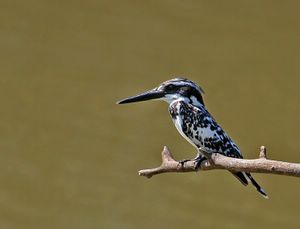 Two of her sisters ran up and said, "Isn't it pretty! Isn't it lovely!" But the youngest sister stood off at one side and said, "I don't think that wooden bowl is good for us. Better leave it alone. It might be something that will harm us." "Oh, you)re always suspicious," said one of her sisters. "What is the little bowl going to do! Someone must have tipped over in a canoe up above, and this is part of their stuff. It can't harm anyone. Let's take the wooden bowl to the house." That's what they did. So they cooked their salmon, ate all they wanted, and after supper put what was left into the little wooden bowl for breakfast. Then they put it behind their little pantry and went to bed.
Two of her sisters ran up and said, "Isn't it pretty! Isn't it lovely!" But the youngest sister stood off at one side and said, "I don't think that wooden bowl is good for us. Better leave it alone. It might be something that will harm us." "Oh, you)re always suspicious," said one of her sisters. "What is the little bowl going to do! Someone must have tipped over in a canoe up above, and this is part of their stuff. It can't harm anyone. Let's take the wooden bowl to the house." That's what they did. So they cooked their salmon, ate all they wanted, and after supper put what was left into the little wooden bowl for breakfast. Then they put it behind their little pantry and went to bed.The next morning when they got up, the wooden bowl was empty. There wasn't a thing in it. "I wonder what's happened to our salmon!" asked one of the sisters. "There isn't a thing in here." The youngest sister said, "I told you that wooden bowl isn't good for us. You wouldn't listen. We'd better throw it away." But the others said, "There must have been a rat or something that came and ate all the salmon. I don't think the dish had anything to do with it."
The youngest couldn't do anything with her sisters. There were three against one. So they cooked some more salmon, ate their fill, put what was left into the wooden bowl, and put it behind the pantry. Then they went up into the hills after more berries.
When they came back about one o'clock, they went to their house and looked at the little wooden bowl. But there wasn't anything in it. The youngest said, "I told you that bowl is no good for us." The others began to believe her and walked out of the house. The youngest had the bowl in her hand. She threw it against a big rock. Celilo was pretty rocky. The girl found a big rock and threw the bowl against it, to break it. When the bowl hit the rock, it dropped down on the ground and sat up as a little baby. One of the sisters ran over and picked it up. A little baby was staring at her.
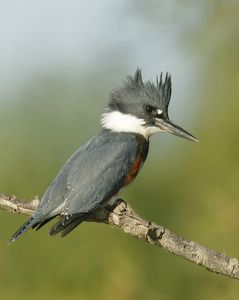 "Oh, it's a little boy baby. Sisters, we'll have a brother now. We'll take care of him, and he'll grow up, and then he can get all the salmon for us. We won't have to get the salmon. All we'll have to do is to dry it and take care of it."
"Oh, it's a little boy baby. Sisters, we'll have a brother now. We'll take care of him, and he'll grow up, and then he can get all the salmon for us. We won't have to get the salmon. All we'll have to do is to dry it and take care of it."But the youngest sister said, "You'd better leave him alone. We don't want him in the house at all." But they were three against one. They took the baby up to the house. It was a cute little baby, full of smiles. It was always smiling. "Isn't he a cute little baby!" said the sisters. "Now we have a little brother."
So they fed it, put it in the bed in the tepee, and went back into the hills to pick berries. As soon as they were out of sight, Coyote changed himself from a little baby into a man. He went down and began digging and digging, to break the dam that they had worked so hard to make. When it was about time for the sisters to come back, he would go into the tepee, get into bed, and change himself into a baby.
Well, that went on for quite a few days. Every day he went on digging and digging. One day he said to himself, "Today I think I'll be able to break through this dam." He was working as hard as he could. "It's about time for them to come home, but I'll stay here and finish breaking the dam.
They can't harm me.", he thought, but nonetheless he had a wooden bowl which he put on top of his head. He kept on digging away and digging away. The sisters got back and went down after water. They saw him there, digging.
"Oh, he's a great big man, and he's breaking our trap!" cried one of the sisters. The youngest sister said, "You think you know it all. I told you that baby was no good for us."
They picked up a stick and ran over to him. They tried to hit him over the head. But he had on that wooden bowl, so they couldn't hurt him. He gave the dam a few more licks and it was broken through. Then he started running away from the girls.
He laughed at them. "You women never will put it over us men. Men always will put it over you."
When he walked away from them, the salmon followed him. When the dam was broken, the salmon went through the hole he had made. Coyote walked along the shore. Whenever he got hungry or tired, he would stop and call to some of the salmon in the river. A big salmon would lump out. He would catch it, roast it, eat it, and rest awhile. Whenever he stopped, the salmon stopped. So he kept coming up the river that way.
On the way down, he had stopped at the place where Dry Falls are now. At the time, the Columbia River flowed there. He had seen a family camping there and catching little fish to eat. They had two nice-looking girls. They looked good to him. He made up his mind that he would camp there and see what he could do.
He came there that evening and went to their tepee. The girls were out picking berries, so he talked to the old folks awhile. He said to the old man, "You'd better come down to the river with me. I saw a couple of salmon down there that you can have. So they went down there and caught one and brought it back and cooked it.
The girls came home. They all had a big feed on the salmon. He talked with them and then stayed over night. Next morning he went down and caught two more and brought them up to the old man. After breakfast Coyote asked the old folks if he could have the girls, to marry them.
"Well, I'll have to ask the girls," the old man said. So he asked them. "No," the girls said, "we don't want to be married yet. We want to be free for a while."
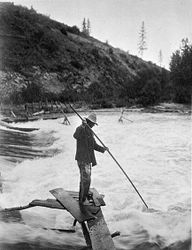 That made Coyote so angry that he broke up the river.
That made Coyote so angry that he broke up the river."All right. If you girls won't have me, you can go hungry the rest of your days. I'll just take the river away from you." So he changed the channel and made the river run down this other way, where it's running now. He said to the old man, "Some day there'll be some smart man who will run the river through here again. Years from now there will be one man who will make the water run this way again."
Then he came on up the river. He kept coming up, coming up, coming up the river till he reached the mouth of the Sanpoil River. A girl there looked good to him. He put in Hell Gate dam to hold the salmon back for her people. The salmon couldn't get over Hell Gate dam. It was too high; they couldn't get over it, the way he had it fixed.
But that girl wouldn't have him. So Coyote said, "Four or five kinds of salmon will come up the big river. King salmon will go up the big river, but no big ones will come up the Sanpoil River. Steelheads first, chinooks, then silver salmon, those little salmon smaller than the silver and red on the outside - those four kinds will go up the Sanpoil. But no king salmon - no big ones." Then he broke up the dam he had made at Hell Gate. Ever since then, there have been rocks and rapids at Hell Gate.
He went on up the river and took his salmon with him. He went and went and went and went. He got as far as Kettle Falls. Of course there were no falls there, but people were living on both sides of the river. And he saw a nice-looking girl there. She was one of the Beaver family, and she looked good to him in spite of her big teeth.
"I'm going to see what I can do here," Coyote said to himself. He caught salmon for the old folks and was good to them. Next morning he asked the old man for his daughter. The old man said, "Yes, you can have her. Then I can have all the salmon I want to eat as long as I'm alive."
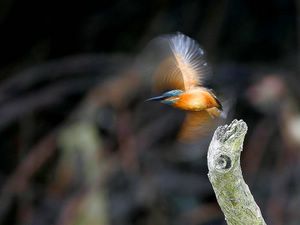 So that's where Coyote got his woman - at Kettle Falls. He made the falls there. That's as far as the salmon could go. He would not break those falls. He left them there. So all these years that is as far as the salmon would go up the river.
So that's where Coyote got his woman - at Kettle Falls. He made the falls there. That's as far as the salmon could go. He would not break those falls. He left them there. So all these years that is as far as the salmon would go up the river.Coyote was very good to Beaver's daughter. He gave her a beautiful fur coat, the softest and most priceless of furs. He gave her the right to live under the falls. "Whenever you see people or hear them coming," he told her, "you can hide under the falls. There you will be safe."
Coyote piled rocks across the river and cut them, so that there would always be a waterfall. He made three levels of rocks, so that there would be a waterfall whether the river was high or low. When the salmon tried to jump the falls, they could be easily caught by people fishing from the rocks.
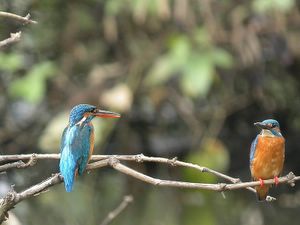 Coyote broke down all the dams from the mouth of the river all the way to Kettle Falls. Soon the salmon were so thick that Beaver could not: throw a stick into the water without hitting the back of a fish. Then Coyote made Beaver the salmon chief. "The people of many tribes will come here to fish," Coyote said to Beaver. "You will be chief over all of them. You must share the salmon with everyone who comes. There will always be enough for everyone. You must never be greedy with it, and you must see to it that no one else is greedy."
Coyote broke down all the dams from the mouth of the river all the way to Kettle Falls. Soon the salmon were so thick that Beaver could not: throw a stick into the water without hitting the back of a fish. Then Coyote made Beaver the salmon chief. "The people of many tribes will come here to fish," Coyote said to Beaver. "You will be chief over all of them. You must share the salmon with everyone who comes. There will always be enough for everyone. You must never be greedy with it, and you must see to it that no one else is greedy."How The Kingfisher Got His Bill (back next)
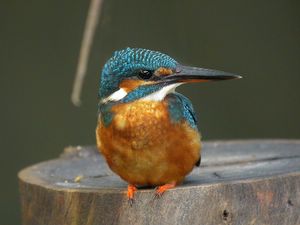 Some old men say that the Kingfisher was meant in the beginning to be a water bird, but as he had not been given either web feet or a good bill he could not make a living. The animals held a council over it and decided to make him a bill like a long sharp awl for a fish-spear. So they made him a fish-gig and fastened it on in front of his mouth. He flew to the top of a tree, sailed out and darted down into the water, and came up with a fish on his gig. And he has been the best gigger ever since.
Some old men say that the Kingfisher was meant in the beginning to be a water bird, but as he had not been given either web feet or a good bill he could not make a living. The animals held a council over it and decided to make him a bill like a long sharp awl for a fish-spear. So they made him a fish-gig and fastened it on in front of his mouth. He flew to the top of a tree, sailed out and darted down into the water, and came up with a fish on his gig. And he has been the best gigger ever since. Some others say it was this way - A Blacksnake found a Yellowhammer's nest in a hollow tree, and after swallowing the young birds, coiled up to sleep in the nest, where the mother bird found him when she came home. She went for help to the Little People, who sent her to the Kingfisher. He came, and after flying back and forth past the hole a few times, made one dart at the snake and pulled him out dead.
When they looked they found a hole in the snake's head where the Kingfisher had pierced it with a slender tugaluna fish, which he carried in his bill like a lance. From this the Little People concluded that he would make a first-class gigger if he only had the right spear, so they gave him his long bill as a reward "You have often seen Kingfisher at his fishing along the rivers, I know; and you have heard him laugh in his queer way, for he laughs a good deal when he flies.
That same laugh nearly cost him his life once, as you will see. I am sure none could see the Kingfisher without noticing his great head-dress, but not many know how he came by it because it happened so long ago that most men have forgotten.
It was one day in the winter-time when Old-man and Wolf were hunting. The snow covered the land and ice was on all of the rivers. It was so cold that Old-man wrapped his robe close about himself and his breath showed white in the air. Of course Wolf was not cold; wolves never get cold as men do. Both Old-man and Wolf were hungry for they had travelled far and had killed no meat.
Old-man was complaining and grumbling, for his heart is not very good. It is never well to grumble when we are doing our best, because it will do no good and makes us weak in our hearts. When our hearts are weak our heads sicken and our strength goes away. Yes, it is bad to grumble.
When the sun was getting low Old-man and Wolf came to a great river. On the ice that covered the water, they saw four fat Otters playing. 'There is meat,' said Wolf; 'wait here and I will try to catch one of those fellows.' 'No! - No!' cried Old-man, 'do not run after the Otter on the ice, because there are air-holes in all ice that covers rivers, and you may fall in the water and die.' Old-man didn't care much if Wolf did drown. He was afraid to be left alone and hungry in the snow - that was all.
'Ho!' said Wolf, 'I am swift of foot and my teeth are white and sharp. What chance has an Otter against me? Yes, I will go,' and he did. Away ran the Otters with Wolf after them, while Old-man stood on the bank and shivered with fright and cold. Of course Wolf was faster than the Otters, but he was running on the ice, remember, and slipping a good deal.
Nearer and nearer ran Wolf. In fact he was just about to seize an Otter, when SPLASH! - into an air-hole all the Otters went. Ho ! Wolf was going so fast he couldn't stop, and SWOW! into the airhole he went like a badger after mice, and the current carried him under the ice. The Otters knew that hole was there. That was their country and they were running to reach that same hole all the time, but Wolf didn't know that.
Old-man saw it all and began to cry and wail as women do. Ho! but he made a great fuss. He ran along the bank of the river, stumbling in the snowdrifts, and crying like a woman whose child is dead; but it was because he didn't want to be left in that country alone that he cried - not because he loved his brother, the Wolf. On and on he ran until he came to a place where the water was too swift to freeze, and there he waited and watched for the Wolf to come out from under the ice, crying and wailing and making an awful noise, for a man.
Well - right there is where the thing happened. You see, Kingfisher can't fish through the ice and he knows it, too; so he always finds places like the one Old-man found. He was there that day, sitting on the limb of a birch-tree, watching for fishes, and when Old-man came near to Kingfisher's tree, crying like an old woman, it tickled the Fisher so much that he laughed that queer, chattering laugh.
Old-man heard him and - Ho! but he was angry. He looked about to see who was laughing at him and that made Kingfisher laugh again, longer and louder than before. This time Old-man saw him and SWOW! he threw his war-club at Kingfisher; tried to kill the bird for laughing. Kingfisher ducked so quickly that Old-man's club just grazed the feathers on his head, making them stand up straight.
'There,' said Old-man, 'I'll teach you to laugh at me when I'm sad. Your feathers are standing up on the top of your head now and they will stay that way, too. As long as you live you must wear a head-dress, to pay for your laughing, and all your children must do the same.
This was long, long ago, but the Kingfishers have not forgotten, and they all wear war-bonnets, and always will as long as there are Kingfishers.
Fox and Kingfisher (back next)
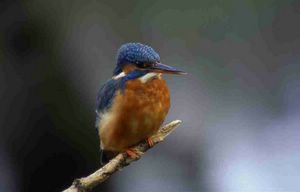 As Fox went on his way he met Kingfisher, Ketlaileti, whom he accompanied to his home. Kingfisher said that he had no food to offer his visitor, so he would go and catch some fish for Fox. He broke through six inches of ice on the river and caught two fish, which he cooked and set before his guest. Fox was pleased with his entertainment, and invited the Kingfisher to return the call.
As Fox went on his way he met Kingfisher, Ketlaileti, whom he accompanied to his home. Kingfisher said that he had no food to offer his visitor, so he would go and catch some fish for Fox. He broke through six inches of ice on the river and caught two fish, which he cooked and set before his guest. Fox was pleased with his entertainment, and invited the Kingfisher to return the call.In due time the Kingfisher came to the home of the Fox, who said, " I have no food to offer you;" then he went down to the river, thinking to secure fish in the same manner as the Kingfisher had done. Fox leaped from the high bank, but instead of breaking through the ice he broke his head and killed himself.
Kingfisher went to him, caught him up by the tail, and swung Fox around to the right four times, thereby restoring him to life. Kingfisher caught some fish, and they ate together. "I am a medicine-man," said Kingfisher; "that is why I can do these things. You must never try to catch fish in that way again."
After the departure of Kingfisher, Fox paid a visit to the home of Prairie-dog, where he was cordially received. Prairie-dog put four sticks in the ashes of the camp-fire; when these were removed, they proved to be four nicely roasted prairie-dogs, which were served for Fox's dinner.
Fox invited the Prairie-dog to return the visit, which in a short time the latter did. Fox placed four sticks in the fire to roast, but they were consumed by it, and instead of palatable food to set before his guest he had nothing but ashes. Prairie-dog said to Fox, "You must not attempt to do that. I am a medicine-man; that is why I can transform the wood to flesh." Prairie-dog then prepared a meal as he done before, and they dined.
Fox went to visit Buffalo, Igunda, who exclaimed, "What shall I do? I have no food to offer you. Buffalo was equal to the emergency, however; he shot an arrow upward, which struck in his own back as it returned. When he pulled this out, a kidney and the fat surrounding it came out also. This he cooked for Fox, and added a choice morsel from his own nose. As usual, Fox extended an invitation to his host to return the visit.
When Buffalo came to call upon Fox, the latter covered his head with weeds in imitation of the head of the Buffalo. Fox thought he could provide food for their dinner as the Buffalo had done, so fired an arrow into the air; but when it came close to him on its return flight, he became frightened and ran away. Buffalo then furnished meat for their meal as on the previous occasion. "You must not try this," said he; "I am a medicine-man; that is why I have the power."
Some time afterward, as Fox was journeying along, he met an Elk, Tses, lying beside the trail. He was frightened when he saw the antlers of the Elk moving, and jumped to avoid what seemed to be a falling tree. "Sit down beside me," said the Elk. "Don't be afraid." "The tree will fall on us," replied Fox. "Oh, sit down; it won't fall. I have no food to offer you, but I will provide some." The Elk cut steaks from his own quarter, which the Fox ate, and before leaving Fox invited the Elk to return the visit.
When Elk came to see Fox, the latter tried unsuccessfully to cut flesh from his own meager flanks; then he drove sharpened sticks into his nose, and allowed the blood to run out upon the grass. This he tried in vain to transform into meat, and again he was indebted to his guest for a meal." I am a medicine-man; that is why I can do this," said Elk.
William Shakespeare, Hamlet, Act 1, Scene 1 ( back / next )
Marcellus:
It faded on the crowing of the cock.
Some say that ever 'gainst that season comes
Wherein our Saviour's birth is celebrated,
The bird of dawning singeth all night long:
And then, they say, no spirit dares stir abroad;
The nights are wholesome; then no planets strike,
No fairy takes, nor witch hath power to charm,
So hallow'd and so gracious is the time.
(The 'It' to which he refers is the ghost of the dead King.)
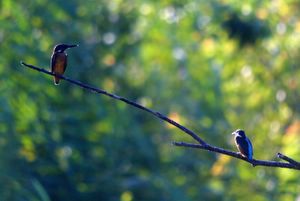 John Milton, On the Morning of Christ's Nativity: ( back / next )
John Milton, On the Morning of Christ's Nativity: ( back / next )But peaceful was the night
Wherein the Prince of light
His reign of peace upon the earth began;
The Winds with wonder whist
Smoothly the waters kist
Whispering new joys to the mild Ocean,
Who now hath quite forgot to rave
While Birds of Calm sit brooding on the charmed wave.
John Keats, Endymion: ( back / next )
O Magic sleep! O comfortable bird
That broodest o'er the troubled sea of the mind
Till it is hushed and smooth.
"Endymion" may be less than obvious - it was for me - here is a bit of Bulfinch to assist:
Endymion was a beautiful youth who fed his flock on Mount Latmos. One calm, clear night, Diana, the Moon, looked down and saw him sleeping. The cold heart of the virgin goddess was warmed by his surpassing beauty, and she came down to him, kissed him, and watched over him while he slept.
Another story was that Jupiter bestowed on him the gift of perpetual youth united with perpetual sleep. Of one so gifted we can have but few adventures to record. Diana, it was said, took care that his fortunes should not suffer by his inactive life, for she made his flock increase, and guarded his sheep and lambs from the wild beasts.
The story of Endymion has a peculiar charm from the human meaning which it so thinly veils. We see in Endymion the young poet, his fancy and his heart seeking in vain for that which can satisfy them, finding his favorite hour in the quiet moonlight, and nursing there beneath the beams of the bright and silent witness the melancholy and the ardor which consumes him. The story suggests aspiring and poetic love, a life spent more in dreams than in reality, and an early and welcome death.
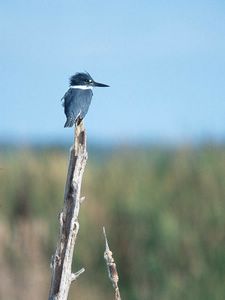 The Pleiades (including Alcyone): ( back / next )
The Pleiades (including Alcyone): ( back / next )The Pleiades were (are?) the seven daughters of Atlas (he who dares, or he who suffers) and Pleione (the sailing queen). Alcyone (queen who wards off evil storms) is the leader. The story is very interesting, and has more bird transformations.
One day the great hunter Orion saw the Pleiads as they walked through the countryside, and fancied them. He pursued them for seven years, until Zeus answered their prayers for delivery and transformed them into birds, placing them among the stars. Later on, when Orion was killed, he was placed in the heavens behind the Pleiades, immortalizing the chase.
Since the Mediterranean navigational year began with the rising of the Pleiades in May and ended when they set, there arose a belief in a goddess who protected sailors from storms. Here they are, truly a sailor's dream:
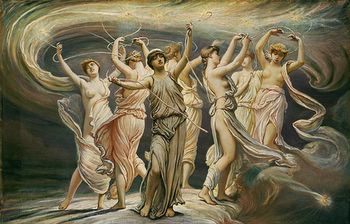 This was done in 1885. The artist, Elihu Vedder, had illustrated Edward Fitzgerald's translation of the "Rubaiyat of Omar Khayyam" the year before - sorta shows eh?
This was done in 1885. The artist, Elihu Vedder, had illustrated Edward Fitzgerald's translation of the "Rubaiyat of Omar Khayyam" the year before - sorta shows eh?Wasn't there an Elihu in Job? Yes there was - more on that later.
Having started out thinking about where stupidity comes from, I got distracted into Kingfishers, and now I have been distracted again into Graces. The three of them: Aglaia (or Aglaea), Euphrosyne, and Thaleia (or Thalia); have been around ... well, simply throughout recorded history, and it follows ... fovever! It may have devolved into mere puerility and sticky pornography, or maybe it was always that. Maybe the insecure little boys that we are and become need lesbian fantasies, I don't know. I have gotten back as far as Hesiod's Theogony and the Cathedral of Siena containing a (cheap Roman) copy of something by a Greek named Praxiteles. Who knows where it will end?
So, wheras I am not in the least ready to say anything serious about it yet - although, come to think of it, I have ended where I began more than once before - for now I will slide in a taste;
Botticelli's Birth of Venus and Primavera:
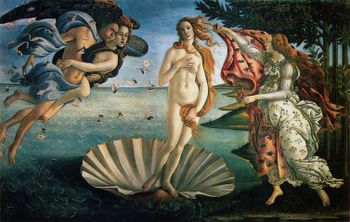
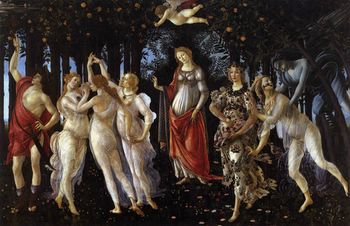
And a Greek fragment, sometime a couple of hundred years before Christ:
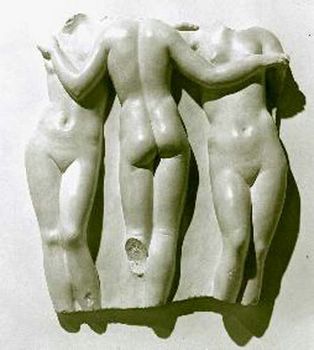
The three Graces; in Greek mythology, the Charites; the youngest, Aglaea - Beauty, Euphrosyne - Mirth, and Thalia - Festivities (this is not as assymetrical as it might appear - it is not any sort of straight 'reflection' or 'translation', more of a 'glide' being the 'twist-and-shout' of symmetries, a circle, as it were, needing both performance and audience); in Roman Gratiae. And then there are the Saving Graces, and Amazing Grace ... there will have to be another post ...
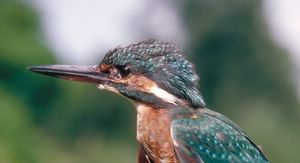 Biblical Embroidery: (back next)
Biblical Embroidery: (back next)A medieval Biblical legend links the kingfisher to the weather and sky. The legend names it as the second bird Noah sent out from the Ark to look for land after the rain had stopped. The originally grey bird flew so carelessly high into the sky that her back turned blue and so close to the sun that she scorched her breast. The female kingfisher thereafter sports a rust-coloured band across her breast and a blue upper body. Noah, exhibiting his wrath in the grand tradition of his Old Testament god, punishes her by making her catch her food from the water: thus the bird's beauty and skill become a bad thing.
Arthurian Myth: (back)
In Arthurian myth, the Holy Grail is held in a remote castle by a custodian known as the Fisher King. Like Adonis, the Fisher King is wounded through the groin. He cannot be healed until the Grail, a universal symbol for the Divine Feminine, is brought back into the world.
Simon Charlie - Transformation
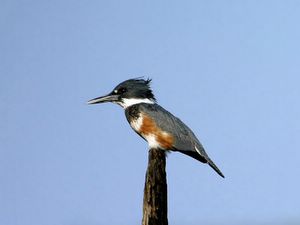 It was a fluke that I struck Hopkins' poem with Kingfishers in it. There were always unanswered questions about Hopkins, and this rhythm, which I found so appealing when I was at school, now appears pretentious too - if it is inherent, then why the need to use accents all over it?
It was a fluke that I struck Hopkins' poem with Kingfishers in it. There were always unanswered questions about Hopkins, and this rhythm, which I found so appealing when I was at school, now appears pretentious too - if it is inherent, then why the need to use accents all over it?The Kingfisher is surprisingly small. I have seen them, my father showed me where they sit waiting for fish. I have not placed the pictures of them carefully into this post, just scattered. They are ubiquitous and I might have found examples from the Bay of Bengal to fit the story - but I didn't, I am tired. I did not see any pictures over salt water - surprising that. They used to have names like Ceyx azureus, and Alcyone azurea (the blue ones).
I lived for a year or so on the land of Simon Charlie, on the edge of Duncan, BC. Simon was a carver, and I helped him with the grunt-work. He had a number of sons who were jealous of my position and concerned aboout their father, who had bad problems with his kidneys. When he started out carving he used some sort of hydrocarbon wood-preservative to accelerate the cedar curing process, and he breathed in a good deal of it, and some days he could hardly stand up for the pain in his back. But Simon said to me that he preferred to have me help him because his indian helpers were often drunk and not dependable - and anyway, he said, "You are more interesting." For my part, I loved him like a father.
Some people do not want to see truths like these - but I was happy that when I visited in 2005, just a few days before his death as it turned out, I was able to be friendly and clear with his family.
I visited him once in the 80s - I was in bad trouble, divorce, failure to become myself, unsuitable career, and so forth and so on. I asked him if he would sell me one of his carvings. I had an idea beforehand (which is always dangerous) that I wanted one of his eagles, but he said that these days he was making transformation masks, and showed me one - it was like a little cupboard, you pulled a string underneath and the doors of the first face opened to reveal a second face inside. The lips inside were puffed out, like a practice of prana yoga, or like Psalm 22 - All they that see me laugh me to scorn: they shoot out the lip, they shake the head - I cannot even say which is which.
He said he had one eagle. It happened to be one that our friend Heather had helped him paint years before - and I took the eagle, and later gave it to my son.
But it was transformation that I needed. And here I am, Simon dead and buried, me still sitting in the same bad trouble, stumbling into Kingfisher myths, and the transformations of Ovid, and Venus and her Graces.
Simon was old when I met him, I thought he was old, and he seemed even older when I visited that time. While we were discussing eagles and masks, and George Clutesi's Potlatch book, and so on, a toddler came into the workshop. I said to Simon, "This must be your grandson." But he said with a smile, "No, that's my son.", and scooped him up onto his lap.
A smile Like Anthony Quinn ... but different.
Bob says somewhere, "that's 'cause she's so obvious and you ain't." He could have said it about himself, probably did, who knows? Simon and Anthony Quinn were so obvious, but they weren't obvious at all; I try to be so subtle and wind up being just ... obvious. The joke's on me, for now at least.
Down.



